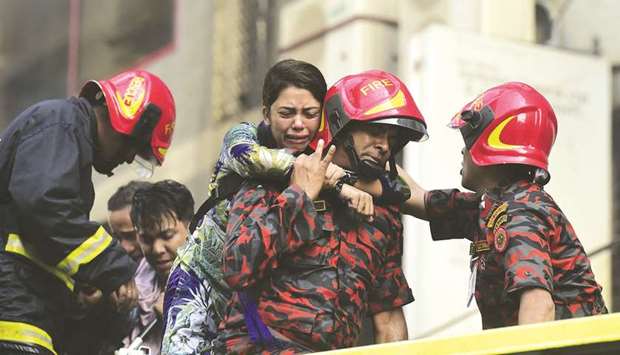The death toll from a terrifying blaze that ripped through a Bangladesh tower rose yesterday to 25, as authorities vowed tough action to improve lax safety standards.
The latest deadly blaze to hit Bangladesh’s congested capital Dhaka tore through the 22-storey FR Tower on Thursday, leaving some of the hundreds trapped inside screaming for help as horrified onlookers massed outside.
Some of those stuck inside made it to safety by sliding down cables on the side of the building, but others took their chances and jumped in a bid to escape the smoke and heat. Six people leaped to their deaths.
Firefighters backed by military specialists – some in helicopters – tackled the flames, lowering ropes to help people escape, while rescuers on long ladders smashed through windows.
But fire fighters were hampered by not having ladder cranes big enough to reach the top floors, officials said.
The fire was later extinguished and yesterday fire fighters completed the process of combing through the gutted and blackened floors of the building.
The fire department initially put the death toll at 19 but police said yesterday that six more had perished. Another was in a critical state in hospital.
There was no immediate indication if others are missing, but more than 70 people were treated in hospital in the wake of the blaze.
Fire disasters regularly hit Bangladesh’s major cities where safety standards are notoriously lax.
Last month at least 70 people were killed in Dhaka apartment buildings where chemicals that were being illegally stored exploded – unleashing a blaze that took more than 12 hours to control.
Following Thursday’s fire, in the upmarket Banani commercial district, authorities have ordered a probe into safety
measures at the building.
“There was no fire exit in the building. There was an alternative stairs. But access to the stairs was closed or padlocked in some of the floors,” fire brigade official Saleh
Uddin said.
He said the fire department had sent several notices to the building to “implement fire safety measures in the building,” but the owner did not comply.
“There were no sprinklers. Fire exits existed only in name,” fire department director Shakil Newaj said.
Housing Minister Rezaul Karim saying a murder case would be filed against those to blame for the tragedy.
“Definitely this is murder. It is not an accident... Nobody will escape the law,” he said.
The mayor of Dhaka north, Atiqul Islam, promised a “zero tolerance” policy in building safety, especially in high-rise buildings.
According to a 2012 study by Bangladesh University of Engineering and Technology, most high-rise buildings in 15mn-strong Dhaka have inadequate fire safety measures.
“We found only two buildings fully compliant,” BUET professor Mehedi Ahmed Ansari said of the survey on 112 buildings, adding that some they looked at were little more than
“death traps”.
A June 2010 fire in the nearby neighbourhood of Nimtoli, one of the most densely populated districts of the capital, killed 123 people.
In November 2012, a fire swept through a nine-storey garment factory near Dhaka killing 111 workers. An investigation found it was caused by sabotage and that managers at the plant had prevented victims from escaping.
Experts said inspections of buildings in the city frequently found fire stairs blocked with stored goods and exit doors locked.

A survivor reacts after being rescued by firefighters from a burning office building in Dhaka.
